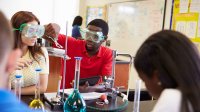Academic Standards Require Social-Emotional Skills
An excerpt from an Aspen Institute report highlighting the close connection between social and emotional skills and college- and career-ready standards.
Now that college- and career-ready (CCR) standards have raised expectations for students’ independence and collaboration, the link between academics and social and emotional development (SED) is even more crucial. To illustrate this, we highlight required SED skills—including emotional, social, cognitive, character, and mindset—for a selection of English, math, and science standards, drawn from different states and organizations to illustrate how CCR expectations from across the country are dependent on SED.
English Language Arts
Although the specifics of states’ English language arts standards vary, most address a range of skills across reading, writing, speaking, and listening—explicitly requiring instruction on a broad range of communication competencies rather than a narrow focus on reading. These competencies indicate that social and emotional skills are an inherent element of literacy in today’s world. Here we present examples from state standards for speaking and writing and a description of SED skills required to meet them.
Adapt speech to a variety of contexts and communicative tasks, demonstrating command of formal English when indicated or appropriate. Students must develop a range of oral communication skills and the ability to use them flexibly. The kindergarten grade level standard, “Speak audibly and express thoughts, feelings, and ideas clearly,” requires students to draw on their emotional skills. In developing their emotional knowledge and expression, they will learn the vocabulary to name and describe their own emotions. (Arizona’s College and Career Ready Standards – SL.6)
Develop and strengthen writing as needed by planning, revising, editing, rewriting, or trying a different approach. Students must develop a suite of cognitive executive function skills, including planning, goal setting, and time management. A capacity for self-organization is necessary to sustain and complete the writing projects described in the standards: A college- and career-ready writer not only can craft a piece of writing but also can adjust his or her strategy in response to critical feedback from others, or after recognizing independently that the current approach is ineffective. (K-12 Louisiana Student Standards for English Language Arts – W.5)
Mathematics
In mathematics, the link to SED is often more visible in what many states call “practice” or “process” standards. These standards articulate key processes and proficiencies that span the K–12 spectrum and accompany mathematical content standards, which present skills and concepts to master for each grade.
Make sense of problems and persevere in solving them. Meeting this math practice standard requires students to develop their cognitive skills and think flexibly. The description includes the expectation that students “monitor and evaluate their progress and change course if necessary.” The ability to shift gears, trying a new strategy when the current one is not working, is important in all grades. Moreover, students must be able to regulate their emotions because students who are easily frustrated can be derailed by a challenging problem. A standard explicitly requiring perseverance also relates directly to mindsets, which “shape how students interpret and respond to challenges.” Research by Stanford professor Carol Dweck documents the positive impact of growth mindset on mathematics achievement. Moreover, the benefits of growth mindset are not limited to mathematics: The complexity of work demanded by the CCR standards in all subject areas will require students to believe that working at learning will develop their intelligence and capacity—and then to act on that belief. (Georgia Standards of Excellence – MP.1)
Construct viable arguments and critique the reasoning of others. This practice standard requires students to develop their social skills. To construct a viable argument, you have to consider the audience’s perspective to determine what arguments will convince them. It is also important to consider others’ perspectives when giving feedback, which is a hallmark of CCR-aligned instruction and something that was not prioritized under prior standards. Giving and receiving feedback is a sensitive social interaction to navigate, even for adults. Accomplishing this successfully depends on social awareness and the ability to understand social cues, such as body language and tone of voice. (Pennsylvania Academic Standards for Mathematics)
Science
The Next Generation Science Standards (NGSS) assert that “all students no matter what their future education and career path must have a solid K–12 science education in order to be prepared for college, careers, and citizenship.” Because science is a social enterprise that relies on discourse, collaboration, and the evaluation of evidence, teachers will have to incorporate SED skills into their lessons in the form of self-awareness, navigating social interactions, perspective taking, and inhibiting inappropriate responses.
Planning and carrying out investigations. This science practice standard incorporates elements of character education, including curiosity, grit, and ethics. Students utilize their curiosity to drive an iterative process, one that by nature requires a certain measure of perseverance. By the time they are in high school, the performance expectations indicate that students should be able to conduct this research “in a safe and ethical manner including considerations of environmental, social, and personal impacts.” (NGSS SEP.3)
Engaging in argument from evidence. Engaging in argument successfully requires social skills like the ability to navigate interpersonal interactions and, in the case of spirited discussion, emotional regulation to inhibit inappropriate responses. Some students have been taught that arguments are to be avoided. But in reality, wrangling with peers about ideas is an important skill and should be the focus of instructional practice. “Because they examine each other’s ideas and look for flaws,” wrote the committee developing the conceptual framework for the science standards, “controversy and debate among scientists are normal occurrences, neither exceptional nor extraordinary.” (NGSS SEP.7)
To learn more about the connection between social and emotional development and college-and career-ready skills—including suggestions for how to integrate SED into a rigorous academic program—read the full report from the Aspen Institute.
